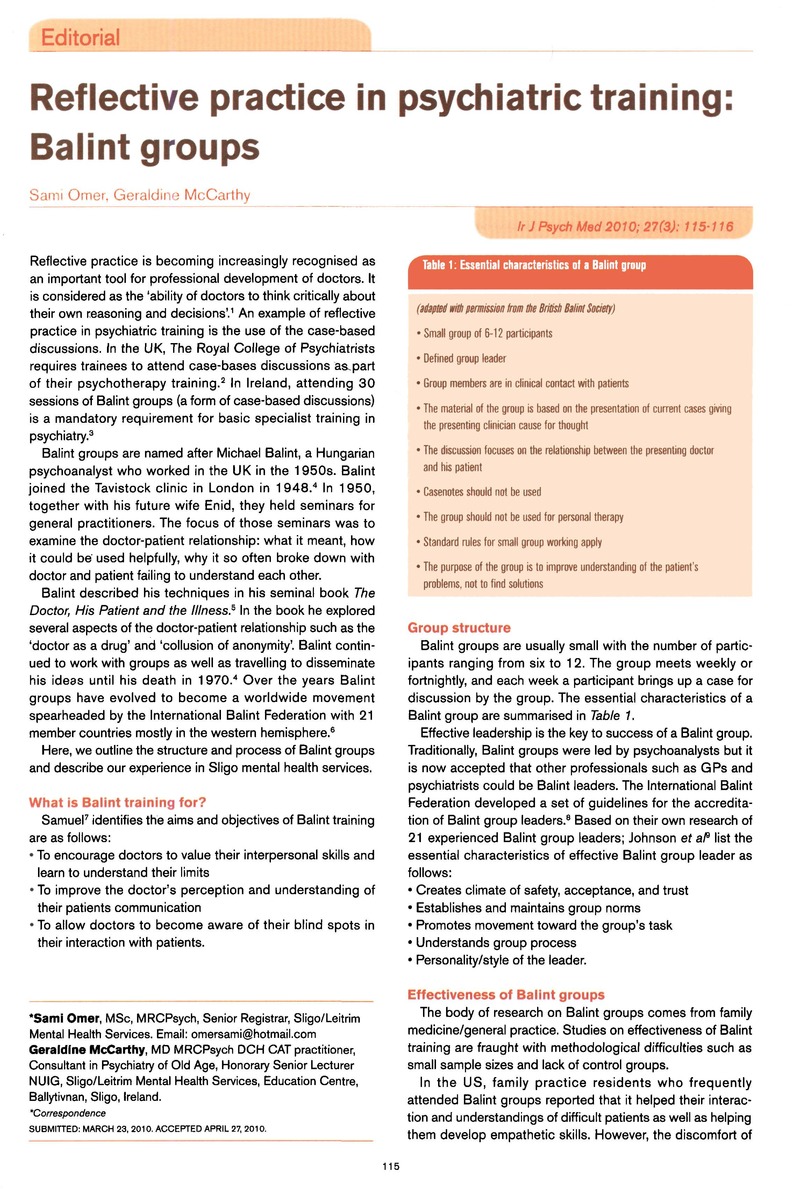Crossref Citations
This article has been cited by the following publications. This list is generated based on data provided by Crossref.
Kelly, Brendan D
2012.
The Irish Journal of Psychological Medicine and the College of Psychiatry of Ireland.
Irish Journal of Psychological Medicine,
Vol. 29,
Issue. 1,
p.
3.
O'Loughlin, Kieran
Guerandel, Allys
and
Malone, Kevin
2012.
A reflection on continuing professional development.
The Psychiatrist,
Vol. 36,
Issue. 5,
p.
189.
Douglas, L.
and
Feeney, L.
2017.
An established practice in new surroundings: concepts, challenges, pitfalls and guidelines for NCHD Balint Groups.
Irish Journal of Psychological Medicine,
Vol. 34,
Issue. 1,
p.
1.
Stojanovic-Tasic, Mirjana
Latas, Milan
Milosevic, Nenad
Aritonovic Pribakovic, Jelena
Ljusic, Dragana
Sapic, Rosa
Vucurevic, Mara
Trajkovic, Goran
and
Grgurevic, Anita
2018.
Is Balint training associated with the reduced burnout among primary health care doctors?.
Libyan Journal of Medicine,
Vol. 13,
Issue. 1,
p.
1440123.
Liu, Wan-lu
Zhu, Zheng-ri
Chen, Chen
Li, Jing
and
Moreno, Olga
2019.
Effect of Balint training in gastroenterology intern nurse practitioners.
Medicine,
Vol. 98,
Issue. 48,
p.
e18129.
Russell, Vincent
O’Rourke, Linda
and
Murphy, Kieran C.
2020.
Undergraduate learning in psychiatry: can we prepare our future medical graduates better?.
Irish Journal of Psychological Medicine,
Vol. 37,
Issue. 2,
p.
73.
Hamadeh, Gracia
Antoun, Jumana
and
Romani, Maya
2020.
The effect of Balint training on the psychological skills of residents beyond family medicine residency.
Health Education Journal,
Vol. 79,
Issue. 8,
p.
987.
Gajree, Neera
2021.
Can Balint groups fill a gap in medical curricula?.
The Clinical Teacher,
Vol. 18,
Issue. 2,
p.
158.
Donohoe, Ann
Guerandel, Allys
O’Neill, Geraldine M.
Malone, Kevin
and
Campion, Dr Mariel
2022.
Reflective writing in undergraduate medical education: A qualitative review from the field of psychiatry.
Cogent Education,
Vol. 9,
Issue. 1,
Elzain, M.
Murthy, S.
Omer, S.
and
McCarthy, G.
2023.
Reflective practice in psychiatric training: Balint groups during COVID-19.
Irish Journal of Psychological Medicine,
Vol. 40,
Issue. 3,
p.
326.
Schwartz, Brian D.
Rogers, Shane L.
Michels, Nicole
and
Van Winkle, Lon J.
2024.
Substantial Increases in Healthcare Students’ State Empathy Scores Owing to Participation in a Single Improvisation Session.
International Journal of Environmental Research and Public Health,
Vol. 21,
Issue. 5,
p.
531.
Gong, Bin
Zhang, Xiaochen
Lu, Chen
Wu, Chengcheng
and
Yang, Jin
2024.
The effectiveness of Balint groups at improving empathy in medical and nursing education: a systematic review and meta-analysis of randomized controlled trials.
BMC Medical Education,
Vol. 24,
Issue. 1,



